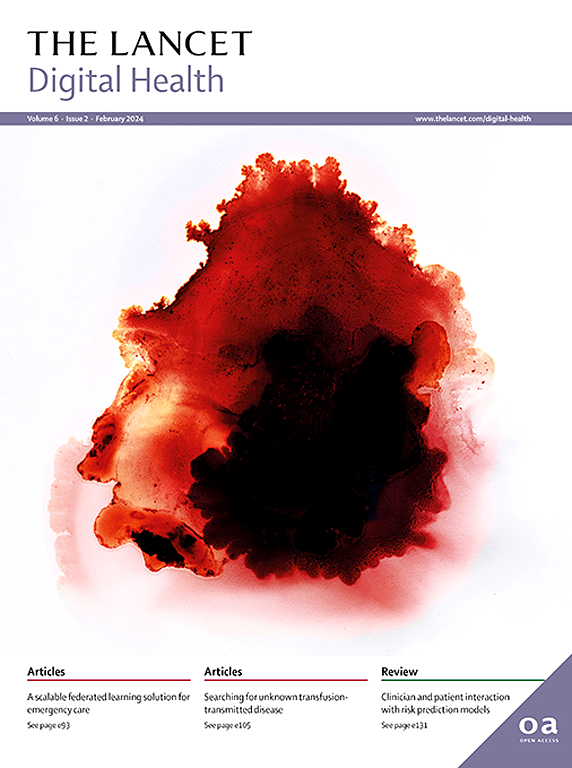情绪能力自助手机应用与认知行为自助应用和自我监控应用对比,以促进健康年轻人的心理健康(ECoWeB PROMOTE):一项国际、多中心、平行、开放标签、随机对照试验。
IF 24.1
1区 医学
Q1 MEDICAL INFORMATICS
引用次数: 0
摘要
背景:有证据表明,心理健康不仅仅是没有精神障碍,因此,人们一直呼吁找到促进人群(尤其是年轻人)心理健康的方法,这需要有效且可扩展的干预措施。尽管心理健康应用程序具有可扩展性的潜力,但很少有心理健康应用程序经过高功率试验的严格测试,这些应用程序源自健康的情绪功能模型,或根据个人情况量身定制。我们旨在测试个性化情绪能力自助应用程序与认知行为疗法(CBT)自助应用程序和自我监控应用程序的对比,以促进健康年轻人的心理健康:在四个国家(英国、德国、西班牙和比利时)的四所大学的试验点进行了这项国际多中心、平行、开放标签、随机对照试验(包括一项预防抑郁症的平行试验)。参与者从四个国家的学校、大学以及社交媒体招募。符合条件的参与者年龄在 16-22 岁之间,具有良好的情绪能力,目前或过去未被诊断出患有重度抑郁症。参与者通过一个独立的计算机系统被随机分配(1:1:1)到通常做法加情绪能力应用程序、CBT 应用程序或自我监控应用程序,最小化国家、年龄和自我报告的性别,并在随机分配后随访 12 个月。主要结果是3个月随访时的心理健康(以沃里克-爱丁堡心理健康量表[WEMWBS]为指标),对完成3个月随访评估的参与者进行分析。结果评估人员对组别分配进行了屏蔽。该研究已在 ClinicalTrials.gov 注册,编号为 NCT04148508,现已结束:2020年10月15日至2021年8月3日期间,共有2532名参与者注册,其中847人被随机分配到情绪能力应用程序,841人被随机分配到CBT应用程序,844人被随机分配到自我监控应用程序。平均年龄为 19-2 岁(SD 1-8)。在 2532 名自我报告性别的参与者中,1896 人(74-9%)为女性,613 人(24-2%)为男性,16 人(0-6%)两者都不是,7 人(0-3%)两者都是。情绪能力应用程序组有 425 人、CT 应用程序组有 443 人、自我监控应用程序组有 447 人完成了 3 个月的跟踪评估。在 3 个月时,各组之间的心理健康状况没有差异(总体 p=0-47)。情绪能力应用程序与 CBT 应用程序(WEMWBS 平均差异-0-21 [95% CI -1-08 to 0-66])或自我监控应用程序(0-32 [-0-54 to 1-19])无差异,CBT 应用程序与自我监控应用程序(0-53 [-0-33 to 1-39])无差异。1315名参与者中有14人因精神健康相关原因入院或住院治疗(或两者兼有),这些原因被认为与干预措施无关(情绪能力应用程序组5人,CBT应用程序组8人,自我监控应用程序组1人)。没有人死亡:解释:情绪能力应用程序和 CBT 应用程序在促进健康青少年心理健康方面的益处有限。这一发现可能反映了这些干预措施的强度较低,以及在低风险人群中通过普及数字干预措施改善心理健康的难度:欧盟委员会。本文章由计算机程序翻译,如有差异,请以英文原文为准。
Emotional competence self-help mobile phone app versus cognitive behavioural self-help app versus self-monitoring app to promote mental wellbeing in healthy young adults (ECoWeB PROMOTE): an international, multicentre, parallel, open-label, randomised controlled trial
Background
Based on evidence that mental health is more than an absence of mental disorders, there have been calls to find ways to promote flourishing at a population level, especially in young people, which requires effective and scalable interventions. Despite their potential for scalability, few mental wellbeing apps have been rigorously tested in high-powered trials, derived from models of healthy emotional functioning, or tailored to individual profiles. We aimed to test a personalised emotional competence self-help app versus a cognitive behavioural therapy (CBT) self-help app versus a self-monitoring app to promote mental wellbeing in healthy young people.
Methods
This international, multicentre, parallel, open-label, randomised controlled trial within a cohort multiple randomised trial (including a parallel trial of depression prevention) was done at four university trial sites in four countries (the UK, Germany, Spain, and Belgium). Participants were recruited from schools and universities and via social media from the four respective countries. Eligible participants were aged 16–22 years with well adjusted emotional competence profiles and no current or past diagnosis of major depression. Participants were randomised (1:1:1) to usual practice plus either the emotional competence app, the CBT app or the self-monitoring app, by an independent computerised system, minimised by country, age, and self-reported gender, and followed up for 12 months post-randomisation. The primary outcome was mental wellbeing (indexed by the Warwick–Edinburgh Mental Well Being Scale [WEMWBS]) at 3-month follow-up, analysed in participants who completed the 3-month follow-up assessment. Outcome assessors were masked to group allocation. The study is registered with ClinicalTrials.gov, NCT04148508, and is closed.
Findings
Between Oct 15, 2020, and Aug 3, 2021, 2532 participants were enrolled, and 847 were randomly assigned to the emotional competence app, 841 to the CBT app, and 844 to the self-monitoring app. Mean age was 19·2 years (SD 1·8). Of 2532 participants self-reporting gender, 1896 (74·9%) were female, 613 (24·2%) were male, 16 (0·6%) were neither, and seven (0·3%) were both. 425 participants in the emotional competence app group, 443 in the CT app group, and 447 in the self-monitoring app group completed the follow-up assessment at 3 months. There was no difference in mental wellbeing between the groups at 3 months (global p=0·47). The emotional competence app did not differ from the CBT app (mean difference in WEMWBS –0·21 [95% CI –1·08 to 0·66]) or the self-monitoring app (0·32 [–0·54 to 1·19]) and the CBT app did not differ from the self-monitoring app (0·53 [–0·33 to 1·39]). 14 of 1315 participants were admitted to or treated in hospital (or both) for mental health-related reasons, which were considered unrelated to the interventions (five participants in the emotional competence app group, eight in the CBT app group, and one in the self-monitoring app group). No deaths occurred.
Interpretation
The emotional competence app and the CBT app provided limited benefit in promoting mental wellbeing in healthy young people. This finding might reflect the low intensity of these interventions and the difficulty improving mental wellbeing via universal digital interventions implemented in low-risk populations.
Funding
European Commission.
求助全文
通过发布文献求助,成功后即可免费获取论文全文。
去求助
来源期刊

Lancet Digital Health
Multiple-
CiteScore
41.20
自引率
1.60%
发文量
232
审稿时长
13 weeks
期刊介绍:
The Lancet Digital Health publishes important, innovative, and practice-changing research on any topic connected with digital technology in clinical medicine, public health, and global health.
The journal’s open access content crosses subject boundaries, building bridges between health professionals and researchers.By bringing together the most important advances in this multidisciplinary field,The Lancet Digital Health is the most prominent publishing venue in digital health.
We publish a range of content types including Articles,Review, Comment, and Correspondence, contributing to promoting digital technologies in health practice worldwide.
 求助内容:
求助内容: 应助结果提醒方式:
应助结果提醒方式:


